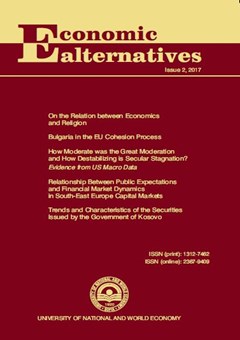Bulgaria in the EU Cohesion Process
Author: Dimitar Hadjinikolov
Abstract
Cohesion is a precondition for implementing a number of important EU internal and external policies, such as functioning of the single market, the Eurozone, Common commercial policy, Environmental policy, etc. Therefore, achieving stronger cohesion is one of the main tasks of the European institutions. But in order to assess the development of the EU cohesion process and thereof the effectiveness of the ongoing cohesion policy, it is necessary to introduce and assess the results of certain cohesion indicators. The article includes nine such indicators: GDP per capita; Research and development expenditure as percentage of GDP; High-tech exports as percentage of total exports; People at risk of poverty or social exclusion; the Gini Coefficient; Life expectancy at birth; Density of motorway network; Share of trains in total inland passenger transport; Population connected to wastewater collection and treatment system. By using the Mean Absolute Deviation (MAD), the study establishes that in the decade of 2004- 2014 there was enhanced cohesion in the EU in 8 out of the 9 indicators used. Based on comparison between Bulgaria’s individual results and those of the EU as a whole, it concludes that Bulgaria has not yet been able to get fully included in the cohesion process: 7 out of the total 9 cohesion indicators are lower than the average for the EU indicators.

